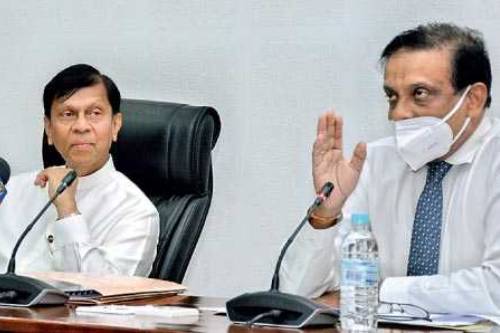In a bid to improve policy clarity, the Treasury yesterday said it is putting the finishing touches on a slew of taxes announced in December 2019 and Budget 2021 to be placed before Cabinet and finalised ahead of April to give businesses a clear start for the next tax year.
Treasury Secretary S.R. Attygalle told reporters that the Finance Ministry was working to legislate tax changes announced shortly after President Gotabaya Rajapaksa was elected, as well as those included in the latest Budget proposals. These include income and corporate tax changes, plus a new goods and services tax proposed in Budget 2021.
Legislation is also being formulated to charge 1% tax on any previously undeclared foreign exchange brought into Sri Lanka, which was a proposal announced by Prime Minister Mahinda Rajapaksa in parliament during the Budget reading last November.
At the time, he said legal provisions will be given to entrepreneurs to return such forex funds for investment in Sri Lanka and they will be liable to a tax of only 1%, which sparked protest from opposition parties that accused the Government of encouraging money laundering.
However, Attygalle said most of the proposals had already been presented to Cabinet and the Legal Draftsman was mid-way in formulating amendments to the Monetary Act to legalise the 1% tax for undeclared forex brought back into the country.
“We hope to have all these measures approved by the Cabinet presented to parliament and legalised by April, so that companies have a clear idea of the operational environment. When this Government came into power it was on the promise of a consistent policy framework that would be provided for five years and this is what we aim to achieve,” Attygalle said in a rare appearance before the media.
He also rejected projections that there could be a public revenue shortfall of Rs. 450 billion in 2021, arguing that in the fourth quarter of 2020, the Government had earned Rs. 65 billion, which was higher than the Rs. 61 billion earned a year ago.
The Treasury Secretary emphasised that the latest tax revenues underscored a resilient economy that is posed to perform better in the second half, especially given stronger vaccine rollout and tourism resumption.
He was referring to an Economic Highlights report released by ratings agency ICRA Lanka earlier this week. The report warned the Government is likely to face a revenue shortfall of Rs. 450 billion, which could see expenditure trimmed by Rs. 140 billion, pushing the deficit to 10.8% and total debt stock to 99.3% of GDP. Growth would also hover at 3.6% for 2021, much lower than the 5.5%-6% predicted by the Government and ICRA Lanka expressed concern that the Government could fall short of the Rs. 2 trillion revenue target.
The Treasury Secretary, however, argued that the polices of the Government, particularly on import restrictions were already bearing fruit with 3,000 new tax files opened.
“When taxes are at reasonable rates, people want to pay them. We can see clearly from the 4Q financial results that even with the second wave of COVID and other concerns businesses have managed to perform well, and we expect this improvement to continue in the coming months. Business sentiment is improving and alongside that we will see a corresponding growth of public revenue, despite import restrictions.”
State Minister of Money, Capital Markets and State Enterprise Reform Ajith Nivard Cabraal participating at the press conference along with Central Bank Governor Prof. W.D. Lakshman noted that Sri Lanka’s foreign debt component was about $ 3.7 billion in 2021, since about $ 500 million was held by local entities. He stressed that Sri Lanka remains dedicated to repayment of all debt and severely criticised rating agencies for what he termed as exerting undue and unfair pressure on Sri Lanka without understanding the policy shift being attempted by the Government.
“We are fully aware of the situation and imposed import restrictions early to safeguard reserves. Investors should not lose confidence in a country so dedicated to ensuring its debt repayment responsibilities are met. We are working to reduce reliance on foreign debt and generate non-debt inflows. Alongside the tax changes, we are also hoping to present the much-awaited Port City legislation to parliament, at least by the next sessions in March, to move it forward and attract investment.”
(FT)

